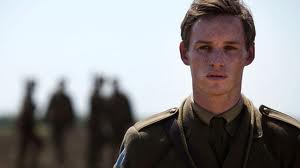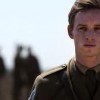 Originally published by L.S. Media. January 23rd 2012.
Originally published by L.S. Media. January 23rd 2012.
L.S. Media Rating ***
Cast: Eddie Redmayne, Matthew Goode, Clemence Poesy, Richard Madden, Thomas Turgoose, Joseph Mawle, George Mackay, Rory Keenan, Laurent Lafitte.
Birdsong is a late 20th Century classic and arguably, to some critics, Sebastian Faulks’ finest novel to date. To fans of the book though who have been desperate to see this First World War drama brought to a larger audience, they have waited, patiently or not, since 1993 and it has to be said it was almost worth the wait.
Perhaps it’s with one eye on the upcoming 100th anniversary of mankind’s most pointless and futile war that this story was finally filmed. If that’s the case it could be called opportunistic. However the grim reality of the scenes and portrayals of war give the whole first part something more than realism, it plunges you into the wanton destruction and devastation that both war and loves betrayal can bring.
The story revolves around Stephen Wraysford, played with some charm but slight reservation by Eddie Redmayne and his time in France in the years before August 1914 and the following years in the mire, mud and the ever creeping threat of death that haunted the men thrown into a war most of them didn’t understand. One of the most harrowing moments of the first part of Birdsong is the scene a young boy gets blown up by a shell going off quite close to no-man’s land. The graphic detail in which the viewer sees the soldier suffer and the wound exposed is unlike any other depiction outside of the film The Trench. It’s gory, make no mistake; but then so is war and the errors of war are visited throughout the programme.
The screenplay by Abi Morgan works well in parts, even though the direction of it is nothing like Faulks’ version which was linear and progressive. This adaptation of the story sees the tale go back and forth between the grim reality of war and the recklessness of marriage and lust. Both easily destroyed, both shot with some determination to highlight the corruption of man. The only trouble with this approach; it made it slightly harder, especially with the scenes between Eddie Redmayne and Clemence Poesy being filmed in almost perfect sunshine and a rose coloured tint to a world that was fast approaching its end, is that it skirted round the periphery of what was happening to those affected before the war. Perhaps there always has to be a “love scene” thrown into any period drama of this magnitude but it doesn’t do anything to the overall appeal of the narrative.
The ending to the first part also seemed contrived to slightly insult the viewer’s mental capacity to work out, at least in part, what was going on. However in these moments there was a genuine and surprising tenderness between two humans thrust into a war not of their making. The excellent acting of Joseph Mawle saved what could have been crass and insincere in lesser hands.
The concluding episode of Sebastian Faulks Birdsong is on Sunday 29th January.
Ian D. Hall
